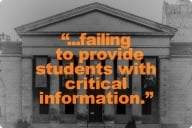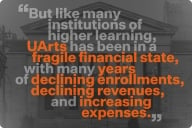You have /5 articles left.
Sign up for a free account or log in.
A growing clamor is calling for an accreditor to oversee the quality of college-level learning that occurs outside of college.
The challenge could be taken on by an existing accrediting agency -- or a new one -- that develops a specialty in non-institutional providers like StraighterLine and Udacity. Or, with more of a trailblazing approach, an accreditor could approve individual courses rather than degrees.
If either idea becomes a reality it would add a seal of approval for a constellation of online course providers and, perhaps, open the door for them to federal financial aid.
The current accreditation system has taken plenty of hits lately. President Obama, Congressional Republicans, think tanks and Bill Gates are among many critics who say accreditors -- who are outsourced gate-keepers for the federal government -- need to do more to encourage innovation and competition.
Whether or not that charge is accurate, accreditors have their hands full of late, given the rapid rise of potential “disruptions” like competency-based education, prior-learning assessment, digital badges and free and low-cost online courses.
Those forms of learning occur largely outside the traditional academic setting. They may lead to college credit only through a circuitous route, and rarely qualify for federal financial aid programs. And many of these forms of teaching and learning have operated outside of the accreditation system that is, in essence, the quality control system for higher education.
Accreditation and Student Learning
A collection of news and opinion articles -- in print-on-demand format -- about the effort by colleges and accreditors to measure learning outcomes may be downloaded here.
That could change, however, if there was a national accreditor that specialized in these emerging models. And the concept appears to be picking up steam.
“There is growing interest in what I’m calling non-institutional education,” said Judith S. Eaton, president of the Council for Higher Education Accreditation, which is an association that represents colleges and recognizes accrediting organizations.
For example, the Minerva Project, a startup, online institution, has been lobbying for an expedited form of accreditation for nontraditional providers.
Eaton, who has written recently on the topic, defines this expanding sector as being “mostly online, noncredit, unconnected to a formal sequence of courses or a degree program, low-cost or free and unaccredited.”
StraighterLine is a prime example. Its 50 or so low-cost, online courses lead to credit recommendations from the American Council on Education (ACE), which is higher education’s umbrella group. A student can earn college credit for successfully completed StraighterLine courses by using an ACE transcript at an accredited college that accepts the credit.
Students cannot, however, get federal financial aid for StraighterLine courses. And the company’s CEO and founder, Burck Smith, has long argued that if a non-college provider can meet the standards for a college course, it should be treated the same way as an accredited institution.
“You don’t have to be a college to offer a college course anymore,” Smith said.
He expanded on that point during his July testimony to the U.S. House of Representatives’ subcommittee on higher education. Smith called on lawmakers to allow accreditation at the course, rather than the degree, level.
“This could include access to all, some or none of the subsidy streams currently enjoyed by accredited colleges,” Smith said in his written remarks. “At a minimum, it would confer the same acknowledgment of quality as enjoyed by colleges. At a maximum, it would level the economic playing field for all providers.”
That proposal is different from what Eaton wrote about, which would be an accreditor specializing in the StraighterLines of higher education. But Eaton said she’s not opposed to either idea.
“I’m for exploration,” she said.
‘Modern States’
Currently, none of the 54 federally recognized accreditors in higher education do quality assurance on a course-by-course basis. But there are several candidates among them who might be able to, experts said. Other established players that are not accreditors possibly could fill that role as well.
One of the seven recognized regional accreditors could take on the challenge. Or, Eaton said CHEA itself might be a possibility. So could ACE or the Council of Adult and Experiential Learning (CAEL), which is a national authority on prior learning assessment. And Quality Matters, a nonprofit group, already does related work by certifying the learning that occurs in online and hybrid courses.
However, some observers said they would prefer a newly established accreditor to play the role of quality assurance at the course level.
There is an “emerging need” for course-level accreditation, said Ralph Wolff, who recently stepped down as president of the Western Association of Schools and Colleges Senior College and University Commission, which is a regional accreditor. But he adds that “I’m not so sure existing mechanisms are up to the task.”
For the idea to work, said Pamela J. Tate, CAEL’s president and CEO, it would need to be a departure from how current accreditors operate.
The new accreditor shouldn’t “replicate institutional accreditation at the course level,” she said.
David Bergeron, who recently joined the Center for American Progress after a long stint at the U.S. Department of Education, has mulled the idea for a course-based accreditor.
Bergeron said the new accreditor should not be a defender of the status quo. And he worries that a regional accreditor would bring “baggage” to the work.
Even so, he said the most important point is to get the job done right. And the current system isn’t working well enough, Bergeron said.
“I don’t care how they get there,” he said. “We’ve got to do something.”
How It Might Be Done
Creating a course-based accreditor won’t be easy, several experts said.
It would also be controversial. Many academics would be uncomfortable about an approach to accreditation that failed to account for a full curriculum. The idea behind regional accreditation is that quality assurance isn't just about whether there is a satisfactory course to teach accounting for English composition, but whether the institution provides a path to a meaningful degree, with the necessary support and resources to do more than pass a series of courses.
For example, faculty members objected, strongly, when a powerful California lawmaker tried to force public colleges to consider treating offerings from outside course providers the same way they would transfer credit from an accredited institution.
Setting up a new accreditor would be fairly simple, Eaton said. The first step would be for non-institutional providers to pony up membership fees.
Reviewing individual courses could be a big job, however. Tate cautioned that the work could get unwieldy and expensive in a hurry.
“It seems like this sort of gargantuan idea that would just die of its own weight,” Tate said.
One solution to that problem might be for the new accreditor to be cautious in ramping up its membership, several sources said.
Earning federal recognition would also be laborious. To get there the Education Department would have to grant its approval to the accreditor. And Congress might have to get involved if the Higher Education Act needed revising to account for the accreditor’s work.
Recognition from the department would take at least 18 months, Bergeron said. But he said there may be a way to avoid the need for a legislative fix.
That’s where course-level accreditation – a concept which is already deeply in the weeds – gets even more complicated. But few know the related issues better than Bergeron, who was Arne Duncan’s chief adviser on higher education.
Bergeron has become a strong advocate for competency-based education. He thinks a fresh approach to accreditation, which would be based on learning outcomes and freed from the credit hour standard, could allow for small clusters of learning to be classified as a “recognized credential” under the Higher Education Act. And credentials can be accredited.
“You’d have to have a recognized credential associated with each course,” Bergeron said. But the currency for accreditation could be a “set of learning activities.”
Wolff was also optimistic that course-based accreditation could earn federal recognition, possibly through an Education Department sponsored demonstration project, which are waivers that allow for experimentation.
“Coursification” is on the rise, Wolff said. And that attention could lead to more of a focus on learning outcomes in accreditation.
“There is an opportunity here,” he said. “It’s something I’m interested in exploring.”
Bipartisan interest around the Beltway for a course-based accreditor has increased in recent months. And the feds aren’t the only ones talking up ways to encourage nontraditional players.
State legislatures in California and Florida this year considered legislation to open up their public education systems to outside course providers, perhaps including private companies that lack accreditation.
“The unaccredited sector is getting bigger,” Smith said. “It has to be addressed, somehow.”








